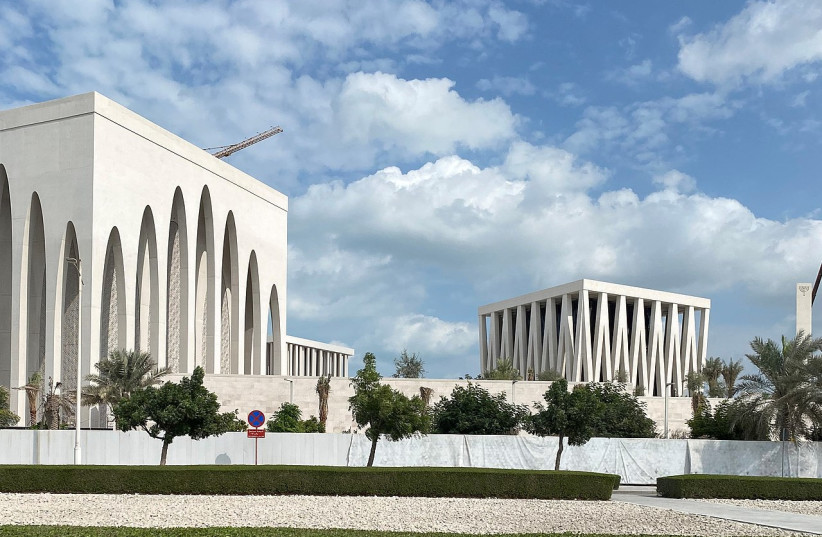A building in the United Arab Emirates, a country best known for the Burj Khalifa, at 2,716.5 feet the world’s tallest building, is hardly the place to think of the flimsy tent-like structure that is the sukkah.
Yet standing in the Ben Maimon Synagogue in the Abrahamic Family House in Abu Dhabi on International Peace Day, I couldn’t help but feel the connection between the Sukkot holiday and the historic opportunity of our current moment.
The first evening of Sukkot, we greet as the first of the ushpizin, spiritual guests, our forefather Abraham. His legacy is the root of religion for billions of people worldwide. It was Abraham’s tent, open to friend and stranger alike, that was a source of spiritual succor and heartfelt hospitality to countless visitors.
By inviting him into our temporary homes on Sukkot, Jews seek to remind themselves of how Abraham’s belief in God spurred him toward welcoming all those in need with dignity and generosity. Those who encountered Abraham and his wife Sarah, were met with a values-infused family, firm in its principles while being benevolent in spirit. They were the first to infuse the Jewish voice into the contemporary discourse of their age.
Last Thursday, a group of students from Yeshiva University and I were warmly hosted by the leadership of Mohammed bin Zayed University for the Humanities in Abu Dhabi. Greeted with a welcome display composed for us in English, Hebrew and Arabic, we discussed potential joint research and student interactions.

Sharing a desire to raise a generation of leaders
It was clear to their faculty and administrators, just as it was clear to us, that we each share a desire to give the rising generation of leaders the mindset and network to create partnerships and friendships.
THAT EVENING, speaking at the Abrahamic Family House (AFH) to an audience of political, academic, and religious leaders – alongside a renowned scholar of urban development – about how our values can shape what we build, from cities to Artificial Intelligence to schools, a shared sense of opportunity was clear to all those present. People with a fraught history are finding the space to share the same roof.
With the hopeful news of additional peace accords between Israel and other Arab countries, there is increased talk of economic prosperity in the region. But what is at stake is more than a historic peace between countries but furthering a new spirit of kinship between historic peoples.
In my experience, representing the flagship Jewish university in conversation with other faith leaders and universities around the world, there is a profound interest in hearing and incorporating authentic Jewish voices into the global moral conversation.
Practically, we have seen this in the dramatic rise of international students in our graduate schools, which infuse top-tier academics with core Torah values. We have even experienced an uptick in non-Jewish students interested in enrolling in our academic Jewish studies programs.
While our undergraduate schools are packed with Jewish students who are naturally drawn to study in an educational institution that combines both a world-class university and a world class yeshiva, this increased interest from people around the world is especially noteworthy. It signals a more prominent place for Jews in a world in search of values and meaning.
After touring the AFH, visitors are invited to contribute, on golden magnetic triangles, their reflections on the exhibit on the “Wall of Intention.” There, one encounters heart-rendering articulations of desires and devotions – expressed in a diverse array of languages by visitors from across the globe.
Alongside wishes written in Spanish, Hindi, and Arabic, one of our students simply wrote out, in Hebrew, Genesis 25:9. The verse recounts the reuniting of Isaac and Ishmael, long estranged, to bury their father Abraham in the Cave of the Patriarchs. Today we find ourselves with an even greater potential. Not simply burying a fallen father but building together a brighter future.
Abraham would be proud.
The writer is president of Yeshiva University.
